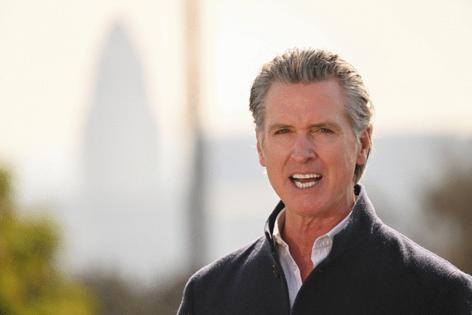Gov. Gavin Newsom asks world leaders to spare California from retaliatory tariffs
Published in News & Features
WASHINGTON — Gov. Gavin Newsom on Friday asked world leaders to spare California from levying retaliatory taxes on goods imported from the Golden State, invoking its economic power as the world’s fifth largest economy.
“Donald Trump’s tariffs do not represent all Americans,” Newsom said in a video, referring to the president’s new “Liberation Day” tariffs that levy a baseline 10% tax on most countries and scale up to as much as 50%.
“We value international trade. We value our manufacturing — the biggest manufacturing base in the United States of America. We look forward to continuing to strengthen those ties, strengthen those bonds.”
The tariffs that went into effect earlier this week — and China’s retaliatory response — have sent stock markets into free fall. It could have grave consequences for the state budget, which is heavily reliant upon high-income earners who draw much of their wealth from stocks.
Newsom said his administration would “identify collaborative opportunities with trading partners” like China, Mexico and Canada, to ensure the state has continued access to imported materials like timber, lumber, steel and drywall supplies needed to rebuild Los Angeles after January’s devastating wildfires.
His office did not immediately respond to a question about whether the governor has the authority to make such carveout exceptions.
“Gavin Newsom should focus on out-of-control homelessness, crime, regulations, and unaffordability in California instead of trying his hand at international dealmaking,” White House spokesperson Kush Desai said in a statement in response to Newsom’s announcement.
The governor’s $322 billion draft budget, released in January, did not account for possible tariffs, though they were anticipated, according to California Department of Finance spokesperson H.D. Palmer.
“Tariffs of the scale and scope proposed by the incoming administration would be highly inflationary and likely lead the Federal Reserve to pause its interest rate cuts and possibly raise target rates again,” Palmer said in an email Friday, referring to the department’s remarks at the time. “California would also be especially vulnerable to tariffs as the ports of Los Angeles, Long Beach, and Oakland and the logistics industry that is concentrated in the Inland Empire are highly dependent on foreign trade.”
The governor is expected to release an updated revised budget next month.
Economists said this week that consumers will soon have to pay higher prices on goods like cars, clothing and electronics, despite the president’s insistence that the taxes will “make America wealthy again.”
While most economic experts urge some patience as the impact of the tariffs unfolds, they also warn that all the volatility present the last three days could in itself threaten the economy.
UCLA’s Anderson Forecast issued a recession watch shortly before Trump announced his tariff decision and warned of the consequences of chaos.
“The exceptional degree of uncertainty surrounding these policies is in and of itself damaging to the economy,” said Clement Bohr, an economist with the Forecast.
“The ad-hoc and fitful tariff policy paralyzes firms’ investment and hiring decisions as they prefer to wait until there is more clarity surrounding future economic conditions,” he said.
But Sung Won Sohn, president of SS Economics in Los Angeles, did not see lingering turmoil.
About 80% of the nation’s economy is driven by the services sector, he said, “which remains largely unaffected by tariffs that primarily target goods. This sectoral composition significantly cushions the broader economy from the full impact of trade-related disruptions.”
____
©2025 The Sacramento Bee. Visit at sacbee.com. Distributed by Tribune Content Agency, LLC.







Comments